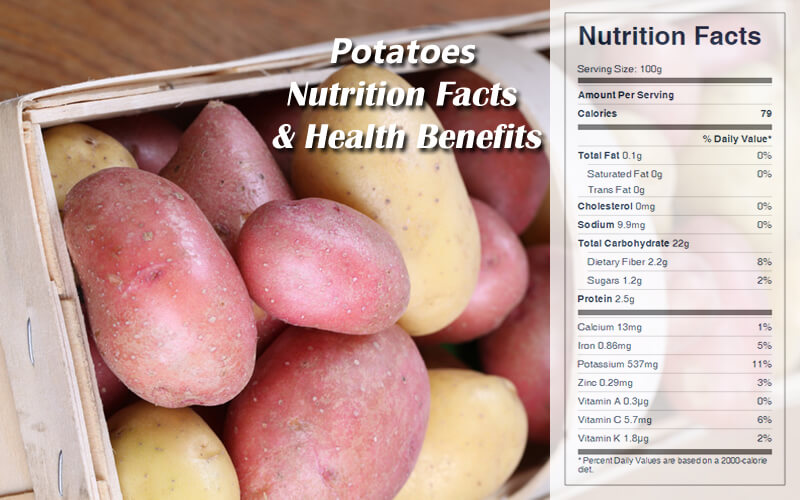Potatoes Nutrition Facts & Health Benefits
The potato is an American native root vegetable that is a starchy tuber of the plant Solanum tuberosum. The potato is a surprisingly good source of vitamin C, as well as potassium, fiber, vitamin B6 and other B vitamins, copper, manganese, and even some lutein. Here are the nutritional benefits of potatoes.
One medium-large potato with skin provides 220 calories, 51 g carbohydrate, 4.6 g protein, 4.8 g dietary fiber, 26 mg vitamin C, 3.3 mg niacin, 22 mcg folic acid, 1.12 mg pantothenic acid, 844 mg potassium, 16 mg sodium, 115 mg phosphorus, 20 mg calcium, 2.75 mg iron, and 55 mg magnesium.

Raw potato is 79% water, 17% carbohydrates (88% is starch), 2% protein, and little fat. It is a rich source of vitamin B6 and vitamin C, with no other vitamins or minerals in a significant amount.
Potatoes Nutrition Facts Label
Health Benefits of Potatoes
Baked potatoes are nutritionally superior, since many of the nutrients, including much valuable potassium, are found in the skins. Potatopeel tea, which contains lots of potassium, is used in many countries for high blood pressure.
This superfood, even when boiled or baked, supplies fiber, B vitamins, useful minerals, and enough vitamin C to keep scurvy at bay, even in winter.
Raw potato juice is used in traditional medicine to treat stomach ulcers and arthritis. The taste, everyone admits, is disgusting but can be disguised by adding honey, carrots, or lemon juice.
Note: The potato is an incredibly healthy food that has gotten a bad reputation, largely because it can be prepared in ways that counteract its benefits. The key to getting the benefits of potatoes is to eat them baked rather than fried.
Potatoes are often broadly classified as having a high glycemic index (GI) and so are often excluded from the diets of individuals trying to follow a low-GI diet. The GI of potatoes can vary considerably depending on the cultivar, growing conditions and storage, preparation methods, and accompanying foods consumed (especially the addition of various high-fat or high-protein toppings). Consuming reheated or pre-cooked and cooled potatoes may yield a lower GI effect due to the formation of resistant starch.
Health Risks
Potatoes contain toxic compounds known as glycoalkaloids, of which the most prevalent are solanine and chaconine. Solanine is found in other plants in the same family, as well as the food plants eggplant and tomato. The potato is a nightshade in the genus Solanum, and the vegetative and fruiting parts of the potato contain the toxin solanine, which is dangerous for human consumption.
The concentration of glycoalkaloids in wild potatoes is sufficient to produce toxic effects in humans. Glycoalkaloid poisoning may cause headaches, diarrhea, cramps, and, in severe cases, coma and death. However, poisoning from cultivated potato varieties is very rare.
Normal potato tubers that have been grown and stored properly produce glycoalkaloids in amounts small enough to be negligible to human health, but if green sections of the plant (namely sprouts and skins) are exposed to light, the tuber can accumulate a high enough concentration of glycoalkaloids to affect human health.